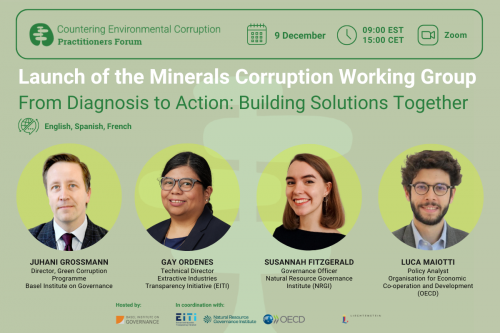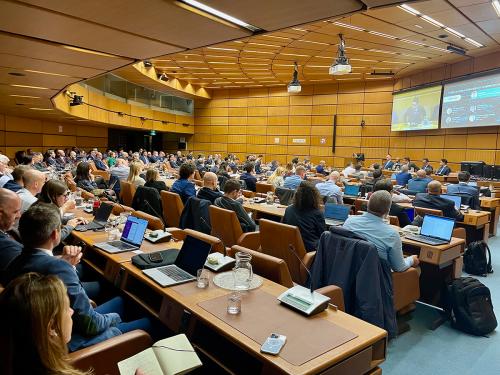Environmental corruption as a roadblock to reaching the SDGs: virtual CoSP side event on 17 December
Environmental crime is lucrative, with its profits easily realised via financial crime and corruption. What is being done to trace illicit financial flows that facilitate environmental crime? And what about the illegally obtained profits derived from it?
On Friday 17 December, the Basel Institute's Green Corruption team organised a special event at the 9th Conference of the States Parties to the UN Convention Against Corruption (CoSP 9) to discuss this crucial barrier to attaining the Sustainable Development Goals (SDGs).
Panelists from government and civil society explored current efforts and remaining gaps in following the money to attack environmental crime. The discussion covered perspectives from national law enforcement and from conservation.
Video and key takeaways
- Watch the full video of the CoSP 9 side event: Environmental corruption as a roadblock to reaching the SDGs
- Listen to the audio file
The panellists explored how our understanding of corruption’s impact on the environment and biodiversity is broadening. This is partly thanks to greater dialogue between anti-corruption practitioners and those working in conservation and natural resource management – conversations that need to continue.
Tackling green corruption is not only about strengthening enforcement against environmental crime fuelled by bribes and collusion. It can involve strengthening accountability and participation in decision-making, for example, so that communities benefit equitably from the sustainable exploitation of natural resources and their conservation.
It’s also about addressing larger systemic issues, like poor beneficial ownership transparency of companies that exploit natural resources, and how illicit financial flows linked to environmental crime and corruption are able to enter the international financial system.
Public-private collusion is rampant in natural resource management. How can governments implement radical and effective environmental protection when their ministers and high-ranking officials run the companies that exploit natural resources?
Grand corruption underlies much industrial-scale environmental degradation, such as the granting of permits to exploit protected land and forests. Bribes can be paid by multinational companies through small suppliers based overseas. This turns such cases into transnational affairs that are almost impossible for investigators to follow without fast and proactive international cooperation.
Environmental crime and related corruption not only damage the environment and biodiversity. They also tangibly reduce government revenues that could be collected from, for example, sustainable and legal natural resource exploitation (fishing, logging, mining…) and fees for the safe disposal of hazardous waste. This harms citizens directly, as does the destruction of the natural resources on which they rely for food and livelihoods. It is not a trade-off between the environment and economic development, as some think: economies suffer long-lasting effects from environmental degradation.
Yet trade-offs and choices are inevitable. In this, leadership and political will are sorely needed. Leaders may be under pressure from powerful interests, but they need to live up to their commitments to citizens – and citizens need to play their part in holding leaders to account.
Corruption – like climate change – is a complex, transnational issue that risks destroying our very existence. Both need to be elevated to the very top of the agenda.
Green corruption demands a multifaceted, multi-stakeholder and transnational response, making use of all available tools:
- “Follow the money” approaches to investigate environmental crime and corruption and recover illicit assets; this is still uncommon among environmental agencies, and needs not only capacity building but adjustments to institutional setups.
- Inter-agency collaboration between government agencies responsible for environmental matters, law enforcement, corruption prevention, tax, customs, and others; joint taskforces help pool resources and responsibilities and ensure a harmonised response.
- International cooperation is key to tackle crimes that cross borders, especially in tracing illicit financial flows and recovering illicit assets generated by environmental crime and corruption.
- Corruption prevention approaches, such as corruption risk assessments and strengthening internal controls, have huge potential to be built into natural resource and conservation programming yet are currently rarely applied.
- Collective Action can help to mobilise the private sector to raise standards of governance in natural resource sectors, bring the incentives of public and private-sector actors into alignment with the needs of citizens.
Speaker line-up and registration
Gretta Fenner, Managing Director of the Basel Institute on Governance, will moderate the discussion between panellists from different parts of the world:
- Elizabeth Hart, Chief of Party, Targeting Natural Resource Corruption project, WWF USA
- Laode Syarif, Executive Director, Kemitraan and Former Commissioner, Corruption Eradication Commission of the Republic of Indonesia
- Juhani Grossmann, Team Leader, Green Corruption programme, Basel Institute on Governance
- Agnes Nabwire, Assistant Commissioner, Tax Investigations, Uganda Revenue Authority
Why is the topic important for UNCAC?
Corruption directly threatens the achievement of SDG 16.4 (reduce illicit financial flows) and SDG 16.5 (reduce corruption and bribery). It affects the poorest most strongly, undermining 1.4 (no poverty). Corruption, money laundering and related financial crimes and governance failures also impact environment-related SDGs by:
- enabling criminals to fund operations and also hide, launder and enjoy the profits of their crimes;
- undermining law enforcement efforts against environmental crimes, and the sustainable governance of natural resources;
- mutating low-scale poaching, artisanal mining and subsistence logging into global criminal enterprises with industrial-scale detrimental impacts on the environment;
- perverting regulations put in place to preserve the environment;
- weakening and diverting government policies developed to ensure environmental rehabilitation and equitable access to natural resources;
- allowing the operation of illegal mines, the trafficking of toxic waste and ozone-depleting substances, illegal and unsustainable trading in flora and fauna, and other environmentally destructive activities.
The panel highlighted the important role corruption plays in facilitating environmental crime and the tools that the UNCAC provides to address this challenge. The panellists outlined the varying approaches of their home States in addressing environmental corruption, and identify remaining gaps.
The discussion explored promising anti-corruption tools for an environmental context and draw insights and lessons learned from transnational environmental corruption cases and related international cooperation.
- See all CoSP 9 special events organised or supported by the Basel Institute on Governance.
- See the programme of all CoSP special events on the UNODC website.



